Search
 Video
Video
Update on Brain Metastases: Navigating Treatment Decisions, Reducing Long-Term Harms
In three parts, UCSF neuro-oncology specialists present the latest on managing brain metastases. News
News
Ranked No. 5 in the U.S. for ENT, UCSF to Host Conference on Latest Research and Treatments in Otolaryngology – Head and Neck Surgery
The UC San Francisco Department of Otolaryngology – Head and Neck Surgery is sponsoring the UCSF Otolaryngology Update 2021, taking place November 11 to 13, 2021. Video
Video
UCSF Musculoskeletal Center is Redefining Pain Management and Non-surgical Treatments for Complex Conditions
At the UCSF Musculoskeletal Center, innovative research is changing how we approach musculoskeletal conditions. By going beyond traditional treatments and exploring cutting-edge technology, the center is pioneering new solutions to complex health issues affecting millions. Video
Video
All About Allergies: Successful Diagnosis and Treatment
This breakdown of common allergies provides clarity on which patients to test and which tests to choose; how to effectively manage chronic allergies, such as allergic rhinitis; as well as signs and solutions for the many types of adverse food reactions.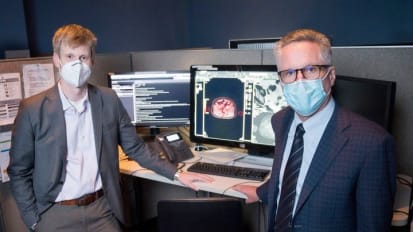 News
News
Newly Approved Prostate Cancer Scan Can Detect Cells that Have Spread to Lymph Nodes
A revolutionary new diagnostic method for prostate cancer can detect prostate cancer cells that have spread to lymph nodes both inside and outside the pelvis, according to the UC San Francisco and UCLA team whose earlier work led to the test’s FDA approval. Document
Document
UCSF Cardiac Surgery Access and Consultations
At UCSF’s Cardiothoracic Surgery Program, we value the opportunity to partner with you in caring for patients with a wide range of cardiac conditions, from arrhythmias to ventricular septal defects. Video
Video
Anal Cancer: A Primary Care Guide to Risks and Screening
Infectious disease specialist Cristina Brickman, MD, MSCE, explains how common anal cancer really is, which HPV types are associated, which patient populations should be screened and when to start – and when to refer to a specialist. Videos demonstrate proper technique for anal cytology collection and digital anorectal exams. News
News
Can Artificial Intelligence Reduce Invasive Testing and Improve Cardiac Diagnostics?
Coronary heart disease is the leading cause of adult death worldwide.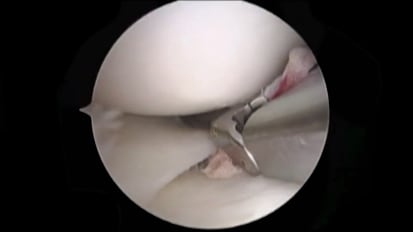 Video
Video
Meniscus: Intrasubstance Tear
Nicholas Colyvas, MD, presents a case study of 28-year-old hiker and cyclist who sustained an intrasubstance tear in her medial meniscus.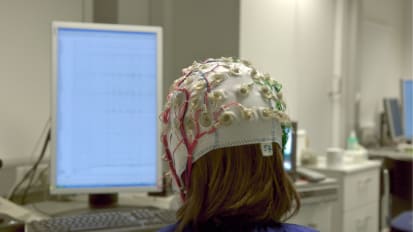 Video
Video
Assessing First Seizures: Steps for Primary Care Providers
Neurologist Manu Hegde, MD, PhD, breaks seizures into basic classes and puts the numerous epilepsy syndromes into three useful categories. He discusses how to take better histories; what to check for during physical exams; and what to know about antiseizure drugs, including specific side effects. Video
Video
A Novel Approach to Aching Knees: How Specialists Are Using Artery Embolization for Osteoarthritis
Many providers have grown weary of offering the same old treatments – physical therapy, steroid injections – to their patients with knee OA, an increasingly prevalent condition that accounts for more than 80% of OA-related chronic pain and disability in the U.S. Video
Video
Erectile Dysfunction: Guide to Diagnosis and Complete Care for a Common Condition
This presentation from urologist John Lindsey, MD, lays out the numerous contributing factors as well as treatments for erectile dysfunction, which affects about 30 million men in U.S. but isn’t always discussed during regular checkups News
News
Alan P. Venook, MD, Recognized With Luminary Award for Gastrointestinal Cancers
Alan P. Venook, MD, a renowned expert in colorectal and liver cancers, has been announced as one of the winners of the 2022 Luminary Awards in Gastrointestinal (GI) Cancers. News
News
Panel Issues First Guidelines to Prevent Anal Cancer in People With HIV
Results from a national study led by UC San Francisco informed the first guidelines at the federal level in the United States to detect and treat anal cancer precursor lesions in people with HIV to reduce the risk of developing anal cancer. Video
Video
Rheumatology Secrets: Diagnosing Inflammatory Disease in Primary Care
Andrew J. Gross, MD, chief of the UCSF Rheumatology Clinic, helps providers sort out the common complaints of pain in the hand, shoulder, back and elsewhere. Video
Video
Navigate the New World of Genetic Testing: Tips and Tools for PCPs
In this practical yet nuanced talk, gastroenterologist Aparajita Singh, MD, MPH, describes technological advances and dwindling barriers that are making tests for pathogenic gene variants more valuable and available than ever before.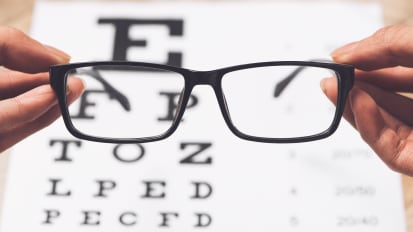 Video
Video
Keeping the Eye in Sight: Ensure Proper Primary Care for Ocular Injuries
When presented with common eye issues – from corneal abrasions and foreign bodies to potentially fractured orbital bones – providers need to make prompt diagnoses, assess urgency and take steps to limit damage. Video
Video
Benign Prostatic Hyperplasia: Tried-and-True Versus New Treatments
Justin Ahn, MD, covers evaluation essentials for patients with signs of BPH; what to know about various medical therapies, including side effects; and the bounty of today’s surgical options.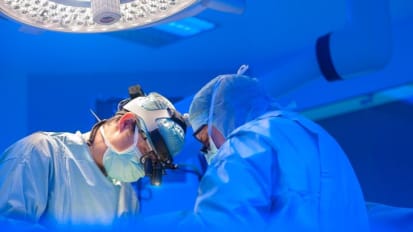 News
News
Adult Acquired Buried Penis: Improving Patient Outcomes
Adult-acquired buried penis (AABP) is a condition in which excess or abnormal surrounding soft tissue covers the penis, resulting in sexual and urinary dysfunction. While it’s associated with obesity, AABP does not typically subside with weight loss. Video
Video
Integrative Cancer Care
As part of the educational lecture series provided to the UCSF Neuro-Oncology Brain Tumor Support Group, Dr. Donald Abrams shared insights into integrative cancer care. Video
Video
COVID Fear and Heart Attacks: Addressing New Obstacles to Care
COVID fear has worsened outcomes for the most dangerous type of heart attack. Interventional cardiologist Krishan Soni, MD, discusses how to respond to the new obstacles and reestablish safe, efficient pathways to lifesaving treatment. News
News
International Breast Cancer Conference Features UCSF Health Experts
Breast cancer experts from UCSF Health will present new research and clinical findings at the annual San Antonio Breast Cancer Symposium, the world’s largest and most prestigious breast cancer conference. This year’s meeting will be held Dec. 7-10. Video
Video
Our Response to COVID-19: Lessons From the AIDS Epidemic
Renowned UCSF HIV/AIDS expert Paul Volberding, MD, who helped pioneer antiretroviral therapy, shares his insights on how the medical community can best respond to the current pandemic. He explains similarities and differences in the health care challenges and emphasizes the value of collaboration. Video
Video
Pregnancy Complications and Stroke Risk
Vineeta Singh, MD discusses the pregnancy- and post-pregnancy-associated risk factors for stroke and the management of these conditions.

